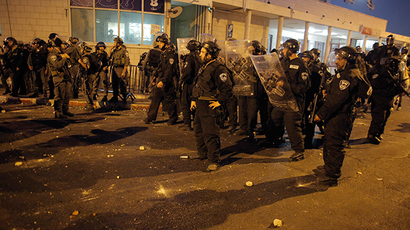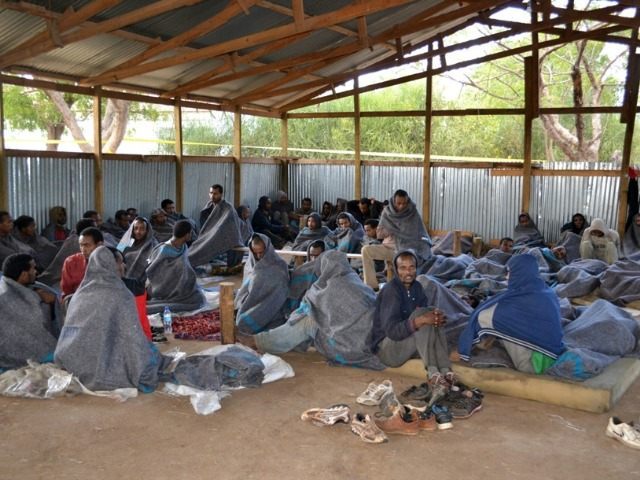
Knesset Member Karin Elharar says violence and discrimination against those with dark skin has become a “major problem" while MK Avraham Naguisa from Likud claimed: “We have lost our trust in the police.”
Elharar was dismayed by the decision taken on Sunday by the Justice Ministry’s Police Investigation Unit, which is an external body that looks into police misconduct, not to take action against two police officers who used a stun gun to subdue Ethiopian-Israeli Yosef Salamsa in April 2014. Salamsa was apparently left traumatized by the incident and committed suicide later that year.
”Police violence against Israelis of Ethiopian descent has become a major problem, and it cannot be treated with a Band-Aid,”State Control Committee Chairwoman Elharar said, as cited by the Knesset’s official website.
The Police Investigation Unit said it had found no evidence of any criminal conduct by police officers and subsequently decided to close the case. Elharar was outraged by the move, calling it a “shocking” decision.
“Those whose skin color is different have been treated differently by the Justice Ministry’s Police Investigative Division,” she added.
Salamsa was arrested after police received reports of a man armed with a knife in a park who was trying to break into a building. Salamsa was believed by the police to be a suspect and they used a stun gun to apprehend him, before arresting him. Following the incident, his family said Salamsa needed psychological treatment. Three months later, he committed suicide after jumping off a cliff.
Lawyer Dror Matityahu, representing the Salamsa family, said that the officers had “violated the protocol for using Tasers, filed false reports, left Salamsa on the floor, handcuffed and beaten, and threatened his family members.
“Any citizen who would have acted in this manner would have been put on trial, but there is a different law for officers,” he added, according to a press release from the committee meeting, as published on the Knesset’s website.
Although the Police Investigation Unit admitted the officers did not follow procedure, the ministry said it had found no evidence of any criminal wrongdoing, despite failing to warn Salamsa that a Taser was about to be used.
”Police officers have rights too, and as long as we have not received any incriminating material – and until now we haven’t – we cannot act against them… Some of the officers have conduct problems, and we have a lot to do in this regard,” said Major General Gila Gaziel, head of the police’s Human Resources Department.
Naguisa, a member for the ruling party, blasted the decision saying, “We have lost our trust in the police. Their community programs have no value. Either the officers lied, or the Police Investigations Department whitewashed. Something stinks in that department.”
Meanwhile, Ziva Mekonen-Degu from the Israeli Association for Ethiopian Jews told the committee that at least one member of every family in the community had been either arrested, detained or has had a criminal investigation opened against him or her.
“Thirteen young Ethiopian-Israelis have committed suicide since the community launched its campaign against police brutality,” she said.
Over the summer of 2015, Israel was rocked by a series of protests held by Israeli-Ethiopians who were demonstrating after video footage emerged of two police officers shoving and pushing a black soldier. The incident was not related to the arrest of Salamsa.
This prompted Israel’s President Reuven Rivlin to say in May that the government “made a mistake” ignoring the issues of the local Ethiopian population.
“It is a wound of a community crying out over its feeling of discrimination and racism that are falling on deaf ears. We must face this open wound straight on,” Rivlin said.
The two officers were suspended, but in June, 2015, Attorney-General Yehuda Weinstein decided to end the investigation into the case after both the state prosecutor and the Police Internal Investigations Department recommended that charges against the policeman be dropped.
There are approximately 135,500 Ethiopian Jews who live in Israel, and more than a third of them (more than 50,000) were born there.
“Israel has prided itself on taking Jews all over the diaspora and making a new Israeli out of them. But it turns out they are second class citizens,” Amir Oren a senior columnist for Haaretz told RT in May, 2015.
“Some of them are Arabs, some of them are immigrants from other countries, and some of them, because of their different skin color are Ethiopians. It is regrettable and Israeli society has a lot of work to do in order to rectify it,” he added.






